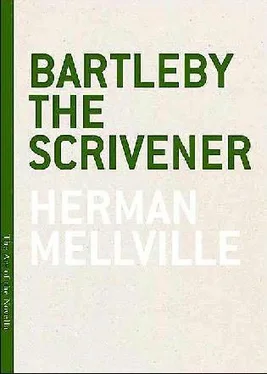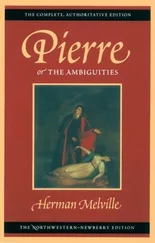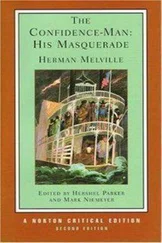Still added days went by. Whether Bartleby's eyes improved or not, I could not say. To all appearance, I thought they did. But when I asked him if they did, he vouchsafed no answer. At all events, he would do no copying. At last, in reply to my urgings, he informed me that he had permanently given up copying.
"What!" exclaimed I; "suppose your eyes should get entirely well-better than ever before-would you not copy then?"
"I have given up copying," he answered, and slid aside.
He remained as ever, a fixture in my chamber. Nay-if that were possible-he became still more of a fixture than before. What was to be done? He would do nothing in the office: why should he stay there? In plain fact, he had now become a millstone to me, not only useless as a necklace, but afflictive to bear. Yet I was sorry for him. I speak less than truth when I say that, on his own account, he occasioned me uneasiness. If he would but have named a single relative or friend, I would instantly have written, and urged their taking the poor fellow away to some convenient retreat. But he seemed alone, absolutely alone in the universe. A bit of wreck in the mid Atlantic. At length, necessities connected with my business tyrannized over all other considerations. Decently as I could, I told Bartleby that in six days' time he must unconditionally leave the office. I warned him to take measures, in the interval, for procuring some other abode. I offered to assist him in this endeavor, if he himself would but take the first step towards a removal. "And when you finally quit me, Bartleby," added I, "I shall see that you go not away entirely unprovided. Six days from this hour, remember."
At the expiration of that period, I peeped behind the screen, and lo! Bartleby was there.
I buttoned up my coat, balanced myself; advanced slowly towards him, touched his shoulder, and said, "The time has come; you must quit this place; I am sorry for you; here is money; but you must go."
"I would prefer not," he replied, with his back still towards me.
"You _must_."
He remained silent.
Now I had an unbounded confidence in this man's common honesty. He had frequently restored to me sixpences and shillings carelessly dropped upon the floor, for I am apt to be very reckless in such shirt-button affairs. The proceeding then which followed will not be deemed extraordinary.
"Bartleby," said I, "I owe you twelve dollars on account; here are thirty-two; the odd twenty are yours.-Will you take it?" and I handed the bills towards him.
But he made no motion.
"I will leave them here then," putting them under a weight on the table. Then taking my hat and cane and going to the door I tranquilly turned and added-"After you have removed your things from these offices, Bartleby, you will of course lock the door-since every one is now gone for the day but you-and if you please, slip your key underneath the mat, so that I may have it in the morning. I shall not see you again; so good-bye to you. If hereafter in your new place of abode I can be of any service to you, do not fail to advise me by letter. Good-bye, Bartleby, and fare you well."
But he answered not a word; like the last column of some ruined temple, he remained standing mute and solitary in the middle of the otherwise deserted room.
As I walked home in a pensive mood, my vanity got the better of my pity. I could not but highly plume myself on my masterly management in getting rid of Bartleby. Masterly I call it, and such it must appear to any dispassionate thinker. The beauty of my procedure seemed to consist in its perfect quietness. There was no vulgar bullying, no bravado of any sort, no choleric hectoring, and striding to and fro across the apartment, jerking out vehement commands for Bartleby to bundle himself off with his beggarly traps. Nothing of the kind. Without loudly bidding Bartleby depart-as an inferior genius might have done-I _assumed_ the ground that depart he must; and upon that assumption built all I had to say. The more I thought over my procedure, the more I was charmed with it. Nevertheless, next morning, upon awakening, I had my doubts, — I had somehow slept off the fumes of vanity. One of the coolest and wisest hours a man has, is just after he awakes in the morning. My procedure seemed as sagacious as ever.-but only in theory. How it would prove in practice-there was the rub. It was truly a beautiful thought to have assumed Bartleby's departure; but, after all, that assumption was simply my own, and none of Bartleby's. The great point was, not whether I had assumed that he would quit me, but whether he would prefer so to do. He was more a man of preferences than assumptions.
After breakfast, I walked down town, arguing the probabilities _pro_ and _con_. One moment I thought it would prove a miserable failure, and Bartleby would be found all alive at my office as usual; the next moment it seemed certain that I should see his chair empty. And so I kept veering about. At the corner of Broadway and Canal-street, I saw quite an excited group of people standing in earnest conversation.
"I'll take odds he doesn't," said a voice as I passed.
"Doesn't go? — done!" said I, "put up your money."
I was instinctively putting my hand in my pocket to produce my own, when I remembered that this was an election day. The words I had overheard bore no reference to Bartleby, but to the success or non-success of some candidate for the mayoralty. In my intent frame of mind, I had, as it were, imagined that all Broadway shared in my excitement, and were debating the same question with me. I passed on, very thankful that the uproar of the street screened my momentary absent-mindedness.
As I had intended, I was earlier than usual at my office door. I stood listening for a moment. All was still. He must be gone. I tried the knob. The door was locked. Yes, my procedure had worked to a charm; he indeed must be vanished. Yet a certain melancholy mixed with this: I was almost sorry for my brilliant success. I was fumbling under the door mat for the key, which Bartleby was to have left there for me, when accidentally my knee knocked against a panel, producing a summoning sound, and in response a voice came to me from within-"Not yet; I am occupied."
It was Bartleby.
I was thunderstruck. For an instant I stood like the man who, pipe in mouth, was killed one cloudless afternoon long ago in Virginia, by a summer lightning; at his own warm open window he was killed, and remained leaning out there upon the dreamy afternoon, till some one touched him, when he fell.
"Not gone!" I murmured at last. But again obeying that wondrous ascendancy which the inscrutable scrivener had over me, and from which ascendancy, for all my chafing, I could not completely escape, I slowly went down stairs and out into the street, and while walking round the block, considered what I should next do in this unheard-of perplexity. Turn the man out by an actual thrusting I could not; to drive him away by calling him hard names would not do; calling in the police was an unpleasant idea; and yet, permit him to enjoy his cadaverous triumph over me, — this too I could not think of. What was to be done? or, if nothing could be done, was there any thing further that I could _assume_ in the matter? Yes, as before I had prospectively assumed that Bartleby would depart, so now I might retrospectively assume that departed he was. In the legitimate carrying out of this assumption, I might enter my office in a great hurry, and pretending not to see Bartleby at all, walk straight against him as if he were air. Such a proceeding would in a singular degree have the appearance of a home-thrust. It was hardly possible that Bartleby could withstand such an application of the doctrine of assumptions. But upon second thoughts the success of the plan seemed rather dubious. I resolved to argue the matter over with him again.
Читать дальше












